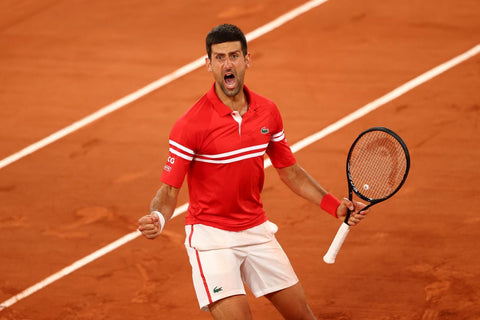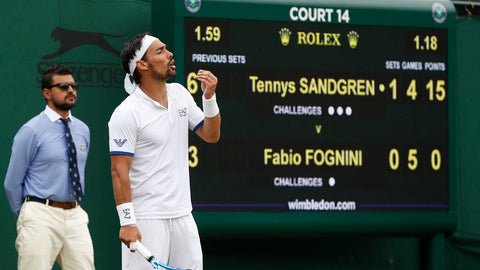The Art of Closing out Matches
We have all been there.
“Ohhh, I had it. How did I lose this? I can’t believe I blew it! What happened? I choked.”
Matches are lost daily as players are not able to close it out! Regardless of the level- Amateurs, Juniors, Pros, College Players- we all eventually face this challenge!
In the end, this scenario is a small sample of the dynamics that play out in any athletic competition- trusting our skills and playing to win, focusing on the process without emphasis on the results, maintaining level of intensity and concentration and being able to work around momentum shifts.
This sounds too familiar – Leading a set at 5-2 and out of a sudden, the whole thing slips away. What comes after is even worse since those losses are extremely painful!
After the match a quick post-mortem analysis makes us replay some key shots and ask ourselves why we were only pushing the ball back, how come we did not attack the second serve or moved to the net to put pressure? Essentially, we lost the match because we lost the mental and emotional advantage we built throughout the game, not because of the lack of shots or strokes.
This sort of “epiphany” tends to be very frustrating for days after the match is lost! Interesting enough, we tend to be harder on ourselves when we give the matches away like this as opposed to losing to opponents outhitting us or playing the important points better!
This type of frustration is what makes this challenge so unique and forces us to push ourselves again when the next chance comes.

Here are the most recurring reasons why a player can lose a match after leading:
- Playing to protect the lead
This is the most common mistake in this situation, as leading players tend to tighten up and become more passive in the hopes their opponents hand them the win. This type of play is known as “playing not to lose”. Leading players give up their more aggressive style of play and rely on eventual mistakes from the opponent. Most of the time this is a key to failure, because even if we win there is a bad feeling on how we played and it can damage our confidence while creating a bad habit of playing similarly again and again.
- Playing focusing in Results
It is inevitable that players tend to be extremely result oriented, specially in important competitions. However one must understand that the main challenge for any athlete (thus, tennis players) is to be completely involved in the process of competition (this means enjoying the moment, focusing on each task at a time and the appreciating the experience regardless of the outcome).
It is easy to tennis players to flirt with the possibility of winning and become distracted solely by the outcome. This situation is dangerous because it opens the doors to lack of focus and loss of discipline towards the initial game plan. In the end, there is an extra attachment just to win and this increases the desire to just protect the lead with playing tight, over analyzing and negatively impacting stroke execution.
- Playing too relaxed
In tennis, momentum means that a player is really on the move and is going to be hard to stop, making great decisions, executing excellent shots and being very consistent through a certain period of time in the match. This is the best situation a player can be in while playing a match. The feeling that you are in the drivers seat and can easily pull out from the match for just a moment and still celebrate a victory.
This scenario presents a huge risk for players that tend to relax too much. This leads to losing one or two games and can be very costly as momentum shifts to the other side of the court. The moment the player with the lead attempts to bring the focus back to the match, it is already a new match- the body gets tight, there is constant overthinking, and the opponent now has the momentum.
Although it may sound that relaxing is the opposite of getting tight, over relaxing means that there is a high possibility the attention has moved to the score rather than the match creating unnecessary anxious situations.
- Inner Criticism
We all have that little voice inside our head that constantly doubt, criticize or judge our actions. To make things worse, this voice usually comes in our minds when we need it the least!
Sometimes when we are about to have something good (say closing out a tennis match), this little doubt can enter our mind with thoughts such as “You better not lot again” or “Don’t be a choker, you have choked before”. And because we let this thought take over, we lose our mental fight against ourselves.
For situations like this, try to stay positive and think of great enforcing ideas such as “If this guy wants to win, he needs to beat me” or “I will not go away until this is over”. Having positive thoughts always brings positive outcomes!
- How to maintain the mental advantage?
When you are winning, always stick with your game plan. The strokes and tactics you used is what made you be in the winning situation, there is not a lot of reason to change it when you are leading. Finish off your opponent the same way!
Like mentioned above, positive thoughts helps maintain concentration and achieve the ideal balance of focus and relaxation. Positive phrases include: “I am winning this match”, “Bring it on, let’s finish this off”, “No way I will go down without a fight”, “I love this game”.
Never fight your inner critic, try to ignore and show who is in control. Maintain a focused and busy state of mind that is solely aimed in the competition!
For increase focused, aim your attention on different targets between points- racquet, strings, ground, move your feet, bounce around. The less you look around, the more focused you will be! And remember to always breathe! Breathing creates physical relaxation and when we get stressed, we tend to change breathing patterns!

Remember, Closing a match out is not different than any other situation of competition. Just like all points played during a match, it requires the right balance of focus, relaxation, and intensity. At the right state of mind you will be able to stay loose, execute your game plan and the most important enjoy the moment.
To learn how to close out matches we always suggest you to play as many tournament matches as you can. Just like any other activity, being a great tennis match closer requires a lot of practice and the right habit patterns, which can only be experienced in a real match.
Coach Ernesto Ponce provides a holistic approach to improve not only the technique aspects of your game, but also develops the right mindset of a champion.
